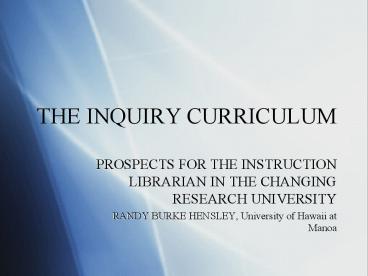THE INQUIRY CURRICULUM - PowerPoint PPT Presentation
1 / 25
Title:
THE INQUIRY CURRICULUM
Description:
THE INQUIRY CURRICULUM. PROSPECTS FOR THE INSTRUCTION LIBRARIAN IN THE CHANGING ... HALLMARK. DISCOVERY. HALLMARK. ENGAGING. HALLMARK. COLLABORATIVE. DISCOURSE ... – PowerPoint PPT presentation
Number of Views:63
Avg rating:3.0/5.0
Title: THE INQUIRY CURRICULUM
1
THE INQUIRY CURRICULUM
- PROSPECTS FOR THE INSTRUCTION LIBRARIAN IN THE
CHANGING RESEARCH UNIVERSITY - RANDY BURKE HENSLEY, University of Hawaii at Manoa
2
WAYS OF THINKING
- PROCESSES OF DISCOVERING HOW INFORMATION BECOMES
KNOWLEDGE AND HOW DATA IS TRANSFORMED INTO MEANING
3
INQUIRY AND RESEARCH
- QUESTIONING
- STRUCTURED MECHANISMS
- DISCOURSE
4
HALLMARK
- EXPERIENTIAL AND EXPERIMENTAL
5
HALLMARK
- DISCOVERY
6
HALLMARK
- ENGAGING
7
HALLMARK
- COLLABORATIVE
8
DISCOURSE
- KNOWLEDGE CREATED BY MEANS OF A DYNAMIC
QUESTIONING, DISCOVERY, AND EVALUATIVE
CONVERSATION
9
INFORMATION LITERACY
- DETERMINE THE EXTENT OF INFORMATION NEEDED
- ACCESS THE NEEDED INFORMATION EFFECTIVELY AND
EFFICIENTLY - EVALUATE INFORMATION AND ITS SOURCES CRITICALLY
- INCORPORATE SELECTED INFORMATION INTO ONES
KNOWLEDGE BASE - USE INFORMATION EFFECTIVELY TO ACCOMPLISH A
SPECIFIC PURPOSE - UNDERSTAND THE ECONOMIC, LEGAL, AND SOCIAL ISSUES
SURROUNDING THE USE OF INFORMATION, AND ACCESS
AND USE INFORMATION ETHICALLY AND LEGALLY
10
UNDERGRADUATE STUDENTS
- DONT UNDERSTAND RESEARCH AS CENTRAL CONSTRUCTION
OF KNOWLEDGE - DONT APPRECIATE DISCOURSE AS CORE DYNAMIC OF
RESEARCH - DONT UNDERSTAND RESEARCH AS A BROADLY APPLICABLE
COGNITIVE PROCESS FOR PROBLEM SOLVING IN THEIR
DAILY LIVES - DONT PERCEIVE RESEARCH AS THE EMBODIMENT OF
VALUES AND PERSONAL CHARACTERISTICS THEY SHOULD
WANT AS THEIR OWN
11
DR. MEL SCARLETT. THE GREAT RIP-OFF IN AMERICAN
EDUCATION UNDERGRADS UNDERSERVED. NY PROMETHEUS
BOOKS, 2004.
- BOYER COMMISSION. Reinventing Undergraduate
Education A Blueprint for Americas Research
Universities. - INQUIRY-BASED LEARNING
- DISCOVERY-BASED METHODS
- NOT FACULTY RESEARCH OVER TEACHING BUT RESEARCH
AS TEACHING
12
SCARLETT
- All the skills of research developed in earlier
work should be marshaled in a project that
demands the framing of a significant question or
set of questions, the research or creative
exploration to find answers, and the
communication skills to convey the results to
audiences both expert and uninitiated in the
subject matter.
13
John Scanzoni. Universities As If Students
Mattered. Rowman Littlefield Publisher, inc. 2005.
- The influential twentieth-century pragmatic
philosopher John Dewey argued that learning
happens best in the context of reflective
thinking. And one learns how to think (analyze,
evaluate, synthesize) by doing--specifically,
trying to solve a problem, that is, seeking to
answer a question.
14
SCANZONI
- The capability of making knowledge is seen as
the essence of the post-industrial information
age. And persons who are skilled at doing that
can be expected to do well in the Twenty-first
Century--both in the marketplace and in civic
society.
15
And finally SCANZONI
- Problem solving and the cultivation of human
capital skills are team-based. Peers learn from
each other. And, although the coach is
presumably more experienced in and capable than
the players and the interns at such problem
solving, the coaches fully expect to learn from
and to grow alongside the players and interns.
16
BRIDGET D. AREND. New Patterns of Student
Engagement Lessons From a Laptop University.
ABOUT CAMPUS, JULY-AUGUST, 2004, 30-32.
- Engagement, defined simply as the time and
effort spent on activities, has become an
established means of understanding the experience
and quality of student learning in higher
education. - Here the goal is not simply to use technology to
automate what we already do but to take advantage
of innovations to change our work and make that
work better.
17
ARTHUR SANDEEN. Enhancing Student Engagement On
Campus. University Press of America, 2003.
- some of the best learning occurs as a result of
trial and error, and where there is rarely a
good substitute for self-discovery.
18
GEORGE D. KUH AND PAUL D. UMBACH. College and
Character Insights from the National Survey of
Student Engagement. NEW DIRECTIONS FOR
INSTITUTIONAL RESEARCH 122 (SUMMER 2004) 37-54.
- The college experience was intended to shape
student attitudes and values as much as stretch
their intellect and expand their knowledge of the
world.
19
RICHARD J. LIGHT. Writing and Students
Engagement. ASSOCIATION OF AMERICAN COLLEGES AND
UNIVERSITIES PEER REVIEW (FALL 2003) 28-31.
- The relationship between the amount of writing
for a course and students level of
engagement--whether engagement is measured by
time spent on the course, or the intellectual
challenge it presents, or students level of
interest in it--is stronger than the relationship
between students engagement and any other course
characteristic.
20
STEPHEN BOWEN. Engaged learning Are We All On
the Same Page? Association of American Colleges
and Universities, Peer Review (Winter 2005) 4-7.
- WITH THE LEARNING PROCESS
- WITH THE OBJECT OF STUDY
- WITH CONTEXTS
- WITH THE HUMAN CONDITION
21
LIS100 LIBRARIES, SCHOLARSHIP, AND TECHNOLOGY
- NARRATIVE
- ASKING QUESTIONS
- RESEARCH ELEMENTS
- VALUES, PERSPECTIVE, AND SIGNIFICANT INFORMATION
- CLARITY, COHERENCE, CREATIVITY, AND CORRECT
- ACTIVE LEARNING
- LINKS TO CAMPUS AND COMMUNITY
- RESEARCH TEAMS
- ETHICS
- APPLICATION
22
IMPLICATIONS FOR LIBRARIANS
- ADDITIONAL COACHES
- TECHNOLOGY ABILITIES
- KNOWLEDGE OF THE MESS
- CULTIVATORS OF STORY AND PERSPECTIVE
- CRITICAL THINKING
- TEACHING WRITING
23
WHAT OUR TEACHING LOOKS LIKE
- BEYOND SKILLS FOR REGURGITATING KNOWLEDGE
- FROM WHAT AND WHERE TO WHY
- WHY HOW DO WE KNOW?
- WHATS THE STORY BEING TOLD?
- INFORMATION LITERACY STUDENT LEARNING OUTCOMES
FOR RESEARCH
24
IN CONCLUSION
25
NO! THIS ONE.































